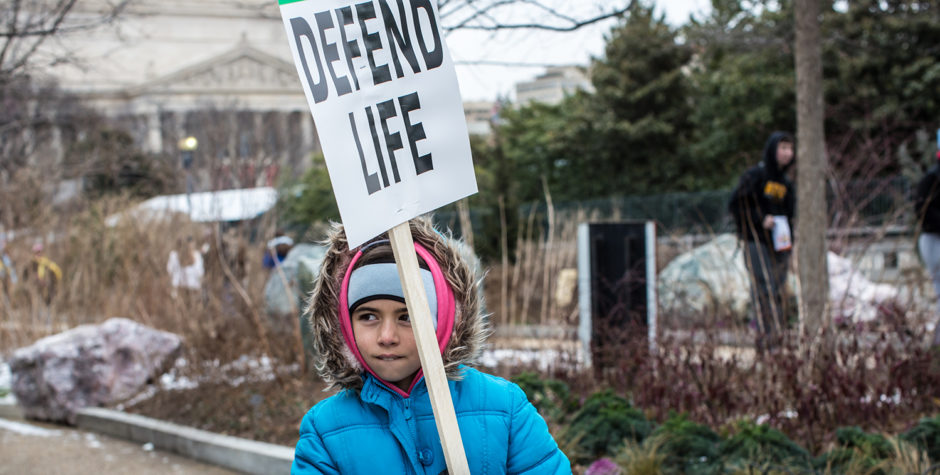ACLJ Urges Supreme Court To Take Abortion Case to Protect the Most Defenseless in Society
The American Center for Law and Justice (ACLJ) has filed a friend-of-the-court brief urging the Supreme Court to review an abortion case out of Indiana.
The case, Box v. Planned Parenthood of Indiana and Kentucky (PPINK), involves two provisions of Indiana law that were struck down by the lower federal courts. One provision requires humane disposition of the remains of aborted babies. The other prohibits abortions based on the unborn child’s race, sex, or disability. The ACLJ filed the amicus brief on behalf of itself and parents from 44 families who gave birth to a child with a disability. These parents have:
children born with various disorders including Down Syndrome, Noonan Syndrome, Patau Syndrome, Turner Syndrome, Edwards Syndrome, Meckel-Gruber Syndrome, Potter Syndrome, spina bifida, and congenital heart disease, among others. Learning of these prenatal diagnoses did not change the love these parents felt for their children. Though many of these families ultimately lost their children, these parents do not consider that to have diminished the importance of the children’s lives. Indiana’s law protects children like theirs and recognizes that unborn children deserve protection from invidious discrimination.
The state of Indiana is asking the Supreme Court to hear the case. Both the federal district court in Indiana, and then the U.S. Court of Appeals for the Seventh Circuit, held that the challenged provisions were unconstitutional and in conflict with Roe v. Wade, the 1973 Supreme Court decision declaring a right to abortion. The ACLJ brief disagrees:
The Constitution does not compel states to treat the bodies of dead unborn children as just so much “medical trash.” . . . Nor does the Constitution force states to allow abortion for any reason at all, no matter how pernicious.
Ban on eugenic abortions
In regard to the ban on aborting babies because of their disabilities, the ACLJ and the parents of disabled children pointed the Supreme Court to concern about “the pressuring of vulnerable parents into irreversible decisions to abort their children.” Specifically:
Indiana can properly respond to at least two very worldly concerns: failure to anticipate the parental capacity to love children regardless of disabilities, and downright erroneous prenatal diagnoses.
As the ACLJ brief notes:
Even parents who say they would have aborted had they known of their child’s disabilities commonly profess great love for those same children. . . . The grim prognosis a physician or genetic counselor offers a pregnant woman cannot possibly capture, and offer as a realistic counterweight, the genuine loving bond a mother or father later experiences.
Furthermore, the prenatal diagnosis of a disability is not even necessarily accurate. The ACLJ’s brief cites example after example of cases “in which parents were told a child would be born with severe disabilities, when in fact the child turned out to be either perfectly healthy or had only minor conditions.” Thus:
a ban on eugenic abortions furthers as well the legitimate interest in avoiding death from “excessive pessimism,” i.e., failure to consider either parental capacity to love or the fallibility of prenatal diagnoses.
Respect for the dead
Regarding the disposition of fetal remains, the ACLJ reminded the Supreme Court:
Concern for the proper disposition of human remains is ancient, indeed rooted in civilization itself. Burying the dead is a traditional obligation in Judaism, a corporal work of mercy in the Christian tradition, and a universal human value immortalized in the ancient Greek play, Antigone. To say that a state has at the very least a legitimate interest in seeing to the proper disposition of human remains is to understate the matter.
The Seventh Circuit had struck the provision down because it rests on a “recognition that aborted fetuses are human beings, distinct from other surgical byproducts, such as tissue or organs.” The ACLJ’s brief shredded that nonsense: “After all, expectant mothers are not pregnant with ‘organs’ or with some species other than homo sapiens.” Moreover, the Seventh Circuit decision “calls into question a host of laws that treat unborn children as human beings, namely, laws that protect unborn babies from torts and crimes.” (A “tort” is a civil wrong that someone can sue to redress, like malpractice or a negligent car crash.) The lower court had brushed this concern aside, reasoning that these other laws “address a valid state interest in promoting respect for potential life,” while “the fetal disposition provisions differ because there is no potential life at stake.” But this rationale, the ACLJ argues, makes no sense:
In every fetal homicide or wrongful death case, the unborn baby is already dead, and thus there is no more “potential life” to respect. Indeed, the same goes for the application of tort, criminal, and disposition of remains laws to born humans – after death, there is no life to save. It nevertheless makes sense to adopt laws governing the remains of those who were once living human beings. The deceased unborn belong to that category. To say otherwise would not just be biologically ignorant, but profoundly insensitive to all those who feel the pain and loss of a miscarriage.
Abortion is a grave injustice. Adding insult to injury, the lower federal courts, at Planned Parenthood’s urging, ruled that a state can’t even treat the dead bodies of aborted babies with the same respect given to other human remains. Making things worse, the same courts declared that a state cannot ban the most lethal form of discrimination – killing – against precious babies who have been diagnosed with disabilities. We strongly urge the Supreme Court to review this very anti-human ruling.
The Supreme Court is likely to announce sometime early in 2019 whether it will agree to hear the case.

